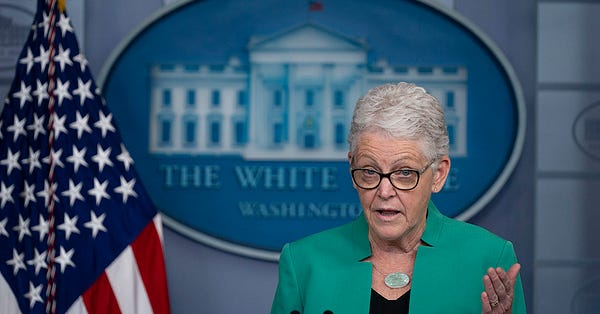Today, as a special treat for non-paying subscribers, I’m letting you in on the weekly subscriber thread.
I’ve also posted the audio from my Friday subscriber-only Zoom chat with Tom Schaller. Tom is one of the most thoughtful observers of American politics I know, and this was a fascinating discussion about the impact of polarization and the political direction of both parties.
I’ll be hosting another Zoom chat on Friday (paid subscriber-only), and I’m still thinking about who to invite. If you have suggestions for a topic or person you’d like me to have on, please let me know in the comments. Also, feel free to offer any other suggestions, complaints, compliments, rants, or thoughts. The comment section is open - as is the subscription section!
Another Path?
Last week I wrote about the inevitability of Democrats passing a massive infrastructure bill via the budget reconciliation process. That still seems the most likely outcome of the current congressional negotiations - but I had failed to consider the slim but growing possibility that the final bill will be less than Biden wants but will include the support of several Republican senators.
On Thursday, a bipartisan group of ten senators (5 Democrats and 5 Republicans) announced that they had “reached a bipartisan agreement on a realistic, compromise framework to modernize our nation’s infrastructure and energy technologies.” The statement also said, “this investment would be fully paid for and not include tax increases.” According to various sources, the high end on spending would be $1.2 trillion, which is around $800 billion less than Biden has proposed.
It’s hard to know what to make of this since the group offered no information on what’s in the agreement - and a framework is not exactly a deal. Even some members were pumping the brakes on how much has been achieved. Not surprisingly, it didn’t take long for liberal Democrats to denounce the effort and call, once again, on Senate Democrats to pass Biden’s original bill through reconciliation. But, truth be told, the liberals are playing a weak hand.
As I’ve discussed at some length, Joe Manchin wants to broker a bipartisan deal (seemingly any deal will do, substance be damned), and if he can get 5 Republicans to agree to a spending plan ( a big “if”), he can demand that Democrats pass the bill. What about a GOP filibuster? Manchin, as well as the other 4 Democrats, could insist that Majority Leader Chuck Schumer bring their bipartisan bill to the Senate floor via the budget reconciliation process and threaten to block any effort to push Biden’s larger plan through. (I suppose it’s possible that such a compromise bill could win 10 GOP votes to break a filibuster and pass through regular order, but I seriously doubt that will happen).
Successful negotiations among the group of ten could put Senate liberals and House Democrats in a tough position: support Manchin’s smaller bill or threaten to vote no if Biden’s larger plan isn’t the vehicle for infrastructure spending. Indeed, some liberals are already drawing a line in the sand over the issue of climate change, which is a crucial part of Biden’s proposal and could end up on the cutting room floor if the group of ten is successful.
According to Senator Ed Markey of Massachusetts, “From my perspective — no climate, no deal. I’m not voting for an infrastructure bill that does not have climate.”
New Mexico’s Martin Heinrich took a similar position:


If the bipartisan group sticks together, Democrats can only afford to lose five votes from more liberal senators. Legislative sledding could be even more difficult in the House, where Democrats have a similarly slim margin and a host of liberal members who might be inclined to kill the group of ten’s compromise legislation.
But if given a choice between passing nothing or passing a pared-down proposal, I strongly suspect that liberal Democrats will back down and take half a loaf. It’s not often you get to pump more than $1 trillion into the economy in infrastructure spending, and, at this point, failure is not an option for Democrats. Moreover, considering the growing signs of discomfort among moderate Democrats about the size of Biden’s proposals - and in particular the plan’s large tax increases - it’s already looking unlikely that the president’s original price tag will be maintained. At this point, liberals are fighting a rearguard action to keep much of Biden’s initial proposal in place. (I do wonder, however, if you give Manchin and Sinema a bipartisan win on infrastructure, would they be more amenable to bending their position on the filibuster concerning voting rights? That would be an interesting deal for some creative Democrats to try and broker with the Filibuster Duo).
One other problem for liberal Democrats is that it is likely that President Biden wants a bipartisan deal above anything else. From a purely political standpoint, a smaller bill with GOP votes is better for him than a larger bill with only Democratic support. It would allow Biden to claim that he has upheld his promise to be an effective Washington dealmaker while at the same time getting a massive infrastructure bill (though, in fairness, the political impact of a bipartisan success is likely minor).
Surely the president doesn’t want a full-scale Democratic revolt. Still, if the group of ten reaches consensus, I suspect Biden will signal his support for their efforts - unless he truly believes liberal Democrats will torpedo it. I suspect, however, that he is willing to call their bluff.
One last caveat: for all the fretting among journalists about the slow pace of negotiations and the growing fractures among Democrats, the longer this process unfolds, it’s more likely that something passes. Eventually, we will reach a point where the embarrassment of failure will be too much for Democrats to consider. Everyone loves an infrastructure bill and getting goodies for one’s home district or state. Moreover, once you stake this much political credibility on a piece of legislation, you need to find a way to get it over the goal line. Just don’t expect everyone to be happy with the final outcome.
What’s Going On?
Fascinating piece by Ben Smith on the fight at the New Yorker over unionization.
There are already ominous signs that it’s going to be a very bloody summer in America. As I wrote about recently, the GOP’s effort to make crime an issue didn’t work very well for them in the recent special House election in New Mexico. But that doesn’t mean it won’t work if crime rates continue to rise.
From a political standpoint, Democrats need to pay attention to this issue. Voters - both Democrats and Republicans - take personal safety very seriously and not simply because they are racists. When I was researching my book on 1968, I was struck by how significant the increase in crime rates was in the mid-1960s and the reasonable view of voters that their political leaders had a responsibility to do something about it. This is not to say racism played no role in calls for “law and order,” but narrowly defining it in such terms missed the fact that fears about crime were real and well-founded. Democrats paid a significant price for not taking voter anxieties on this issue seriously enough.
While I remain enormously sympathetic with last summer’s Black Lives Matter protests, the calls for “defunding the police” were ill-advised, bad policy, and created a needless political vulnerability. Many on the left continue to view the police in strictly negative terms, but overall, most Americans positively view them. So the relentless attacks on the police have created a political problem for Democrats. They need to appeal to their core supporters on police reform while also not alienating less liberal voters who view the police as essential to their safety. Democrats will need to figure out how to thread this needle because it certainly seems that crime and violence are not going to stop rising.
I’m not a lawyer but the Department of Justice secretly subpoenaing the phone records of members of Congress and their families seems like it might be a bad thing.
Trump-inspired death threats are terrorizing election workers across the country.
I’m a long-term skeptic and critic of the conventional wisdom in American foreign policy, but this argument by Stephen Wertheim, dismissing the importance of NATO, is simply off-base. NATO is arguably the most successful military alliance in history. It helped to prevent another war in Europe, merged the strategic and political interests of country’s that were formerly enemies, and is today containing and deterring Russian aggression. Moreover, from a US standpoint, it ensures stability in one of America’s most important trading partners. Sure, it amounts to Europe outsourcing its security to American taxpayers, but the return on investment is still enormous. I understand that those who urge greater restraint in American foreign and national security policy want to see the US better prioritize its foreign policy goals, but European security is not the place to start.
According to an analysis by the Washington Post, “Coronavirus infections dropping where people are vaccinated, rising where they are not.” In related news, water is wet.
Just an FYI, you can’t own the libs if you’re dead.
I endorse every word of this John Berman rant.
Musical Interlude
I spent most of the weekend listening to my daughter’s favorite songs by artists such as Olivia Rodrigo, Dua Lipa, and Megan Trainor. In related news, I have failed as a father.
So I figured I would go with an old standby - the Grateful Dead show from February 18, 1971, in Port Chester, New York. I love the band’s sound in 1971. It’s the bridge between the primal/psychedelic sound of the late 60s and the birth of the more rock, Americana-focused, singer-songwriter material of the early 1970s.
This show is an all-time classic with five news songs introduced, including the great Jerry Garcia number, “Wharf Rat.” The jam after “Wharf Rat” back into “Dark Star” is legitimately five of the most incredible minutes in the band’s entire history (and no, I’m not exaggerating).

















